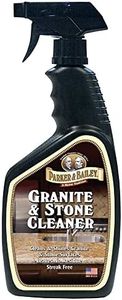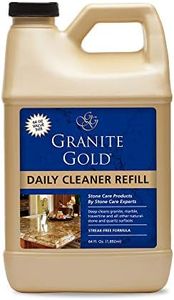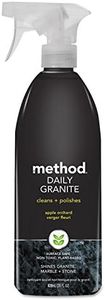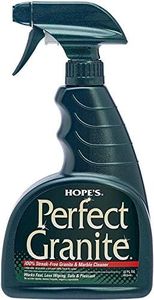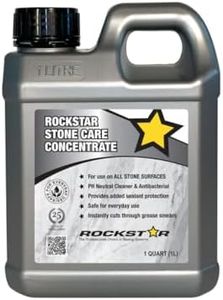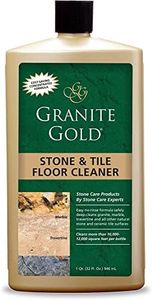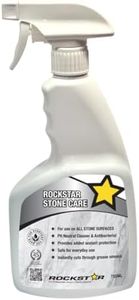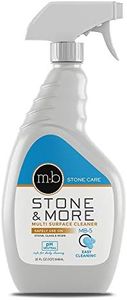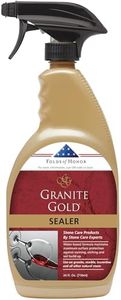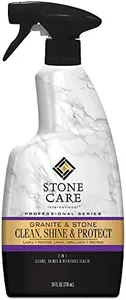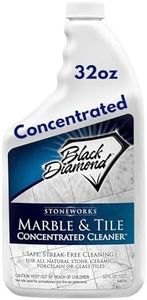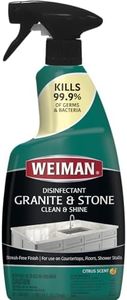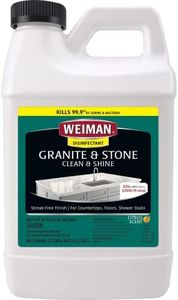We Use CookiesWe use cookies to enhance the security, performance,
functionality and for analytical and promotional activities. By continuing to browse this site you
are agreeing to our privacy policy
10 Best Granite Cleaners
From leading brands and best sellers available on the web.By clicking on a link to a third party's website, log data is shared with that third party.
Buying Guide for the Best Granite Cleaners
Choosing the right granite cleaner is important to maintain the beauty and longevity of your granite surfaces. Granite is a natural stone that can be sensitive to harsh chemicals and abrasives, so picking the correct cleaning product can help protect against damage, stains, or dullness. When shopping for a granite cleaner, you'll want to consider how effective it is at cleaning, how safe it is for your surfaces, and whether it leaves any unwanted residue behind. Understanding the key features can help you choose a cleaner that's best suited to the needs of your home and your cleaning habits.pH LevelThe pH level of a cleaner tells you how acidic or alkaline it is, which is important because granite can be damaged by products that are too acidic or too basic. Acidic and alkaline cleaners may etch, dull, or weaken the protective sealant on your granite surfaces. Look for a granite cleaner that is pH-neutral, as this will be gentle and safe for your countertops and tiles. Avoid cleaners labeled as acidic or for heavy-duty bathroom use, as these can be harmful to granite. If you are unsure, check the product label or description to confirm it's made for stone or granite and states it's pH-neutral. If your cleaning needs are everyday spills, a pH-neutral cleaner is the right choice to keep things safe.
IngredientsThe ingredients of a granite cleaner determine whether it's safe for your surfaces and your health. Some granite cleaners use natural ingredients like plant-based solvents, while others include artificial chemicals. It's best to avoid products with bleach, ammonia, vinegar, lemon, or harsh chemicals, as these can break down the sealant and damage granite. If you want an eco-friendly or allergen-free option, look for cleaners that specify using natural or non-toxic ingredients. For those with sensitivities or children and pets in the home, gentle, non-toxic cleaners may be preferable.
Residue and FinishResidue refers to the film or streaks that some cleaners may leave on your granite after cleaning. Granite looks best when it has a clean, streak-free shine, so you'll want a cleaner that evaporates quickly and doesn't leave behind a sticky or dull residue. Some cleaners are specially designed to bring out the natural shine of granite, enhancing its appearance without making it look greasy or slippery. If you like a glossy, polished look, look for a cleaner that lists streak-free or polish-enhancing formulas. If you prefer a matte finish, ensure the cleaner does not contain polishing agents.
Purpose (Cleaner vs. Sealer)Some products are designed only to clean, while others also help maintain or refresh the granite’s protective seal. Cleaners are meant for regular removal of dirt and spills, while sealers offer extra protection against stains and liquids soaking in. If your granite is already sealed, a regular cleaner is sufficient for most uses. If your granite is older or you notice water no longer beads on the surface, you might benefit from a cleaner that also includes some sealing properties. Choose a product that matches your current maintenance needs—a pure cleaner for everyday use, or a two-in-one cleaner and sealer if you're looking to upkeep protection during routine cleaning.
Ease of ApplicationGranite cleaners come in various forms such as sprays, wipes, or concentrates that need to be diluted. Sprays are convenient for quick, daily cleaning, while wipes offer extra ease for small spills or on-the-go use. Concentrated solutions may be a good choice for those who prefer to mix their own cleaning strength but require measuring and preparation. For everyday cleaning in kitchens or bathrooms, most people prefer pre-mixed sprays or wipes as they save time and effort.
